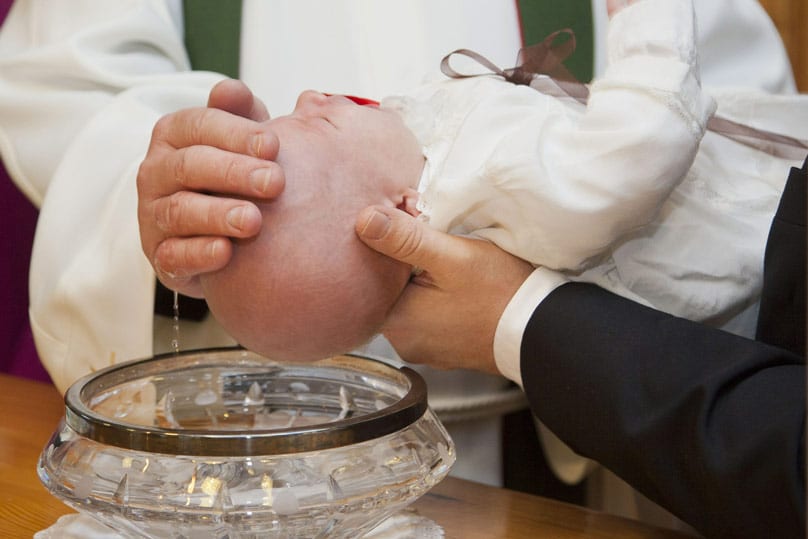
Last week, a priest responded to the article “Five Rules for a Royal Bride” with a humble request: “I wish Catholics in the pews would write us new pastors and new ordained priests advices like these! Y’all help us to be men of God, men for others, and men that have joy in their lives! Send me your five advices before I become pastor . . .”
Can do. I’ve already written about Six Sermons I Could Do Without, and that covers a lot of ground. But sermons are far from the only time when a pastor’s words and actions affect the parish. Here are my five pieces of advice from a lifelong Catholic who loves priests:

1. Welcome babies. If your church is known for being hard on babies and their mums, then expect your congregation to get more and more grey until it’s gone. It’s just basic math.
Most parents are trying to keep their kids quiet, while teaching them how to be in church. If you smile at children, encourage their parents, have friendly, positive things to say from the pulpit and in confession, maybe provide appropriate books or coloring pages and crayons, perhaps commit to the child-friendly Catechesis of the Good Shepherd, and — dare I say it? set up a changing table somewhere on the premises — you’ll be amazed at how beloved you become. It’s mainly your tone that encourages families, not programs or bells and whistles.
I know it’s annoying when kids get out of control. There are some parents who don’t discipline their toddlers or even their teenagers, and it can be disruptive or irritating, when you’re preaching or trying to make a reverent atmosphere. But I’m here to tell you that erring in the other extreme is deadly. This gig is hard enough, and parents and kids both desperately need to know that, even if the rest of the world looks on children as parasites, the Church loves, wants, and needs them. If you make it clear that they’re not welcome, then they will leave, period.
2. Ask for specific things you and the parish need. Many people are simply too busy to be heavily involved in the daily ins and outs of parish life, and even if we see service opportunities in the bulletin, we’re likely to think someone else will surely take care of it — or else we just forget as our own daily duties swallow up our time and attention.
But if a priest clearly explains some particular need specifically, and puts a sign-up sheet at the door, then I’m a lot more likely to turn up. Or, I hate to say it, but if a priest asks me in person if I can do some particular thing? I will probably say yes, because I’m busy, but I’m not a monster.

Be specific. Don’t just have a soup kitchen; mention from the pulpit that the soup kitchen needs cereal and tomato sauce right now, and that there’s a box by the main entrance. Don’t just rubber stamp adoration; mention that there is a 7 p.m. slot that needs filling, and you’d love to see someone’s name there by Wednesday. Don’t just pray for the intentions of the parishioners; mention that the Kowalewski family has a child in the hospital, and they could use prayers and help with meals. Don’t just have a collection; mention that, if everyone increased their offering by two dollars, you’d be able to pay for [specific expense].
And don’t just be lonely; let people know that you enjoy dinner invitations, and bring along a bottle of wine.
You can do some of this kind of thing no matter what size the parish. This kind of specific approach not only gets things done, it binds the community together in a way that we all need. And ask for our prayers for yourself, too.
3. Be accessible. I know, I know. You’re only one man, but everybody wants to tug your sleeve and tell you about the scandalous excesses of Mrs. Dodderpants, who thinks she can just barge in change the brand of donuts they serve after the 10 a.m. Mass, and someone needs to do something now! But there are also people with legitimate urgent needs that no one else but a priest can really answer. Sometimes people need to make contact with Christ’s representative on earth, but they can’t get past the snippy parish secretary. People have left the Church heartbroken over this issue, because they feel like no one cares, and for good reason.
It’s fine to set boundaries, and to tell people who are wasting your time that you have to move along. And it’s okay to be shy, too. No one should expect every priest to be a sociable extrovert. But if people in your flock truly can’t ever get in touch with you, in person, over the phone, or by email, there’s a problem.
4. ABC: Always Be Confessioning. Okay, that didn’t quite work out. But what I mean is: Lots of places can supply community, entertainment, edification, education, aesthetic enrichment, and so on. But no one else can give us Jesus. So if the sacraments, especially confession and the Eucharist, aren’t frequent, easy to get to, and easy to find out about, then what are you doing?
Please offer confession often, at regular times (not fifteen minutes on Tuesday mornings). People aren’t showing up, you say? Then routinely talk it up in your sermons. Make a big deal out of it, make sure people can’t just forget about it, and tell them over and over why they and their kids should want to be there.
And literally for the love of all that is good and holy, put Mass times, Holy day of obligation times, and confession times in the bulletin and on the first page of your website. That’s the main reason people want bulletins and websites.
5. Take care of yourself. Hear me out, tough guy. Yes, you’re here to serve other people. But you can’t serve anyone if you’ve ground yourself into a damp spot in the rectory parking lot. Don’t be the pastor who was too busy to get that weird lump checked out. Don’t be the pastor whose mental health issues were visible from space, but he didn’t have time to see a therapist, and then he had a nervous breakdown.
Now, also don’t be the priest who seems to feel that, in return for the sacraments, he deserves to be supplied with luxe vestments, fine liquor, and endless hours on the golf course. The grunts in the pew aren’t taking lots of bubble baths, and they’ll resent being made to feel less important than their pastor. But basic self-care — regular medical care, a little exercise, therapy and meds if needed, and the occasional vacation or retreat, maybe even keeping up a hobby — these are how you care for the body and mind God gave you so you can do your job. Don’t feel guilty for doing basic maintenance.
By caring for yourself, you’re also setting a good example for your sheep, and helping to humanize yourself to us. Sheep sometimes need reminders that their shepherd is human.
****
Is this list exhaustive? No, it’s not. But I’m sure you have a list for me, too. So I’ll just say: Thank you, priests. Thank you for all your years of study. Thank you for forgoing the joys of marriage. Thank you for giving up sleep, and weekends, and privacy. Thank you for setting yourself up for so much scrutiny. Thank you for putting yourself there at the altar. Thank you for bringing us Christ.

